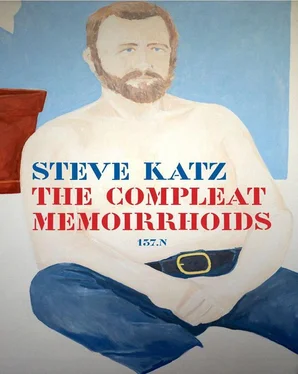And through my meek understanding of contemporary physics I cannibalize what I apprehend into metaphor. So I have set the number of these Memoirrhoids at 137.n…, since 1/137 is the fine structure constant, a number that as yet has no plausible explanation, except that it was set in place at the “big bang,” and its smallness, that surprises physicists, is one parameter that makes life possible. It is a constant in our universe, though according to string theorists there are many “big bangs,” imperceptible to us, each establishing its own physics and its own fine structure constant. They offer a multiverse on what Leonard Susskind calls “the landscape.” I relish the notion that everything happens, that there is a promiscuity of possibilities, even if it is outside the dimensions of our perception, and outside the domain of life.
As always it comes down to Pandit Yogi Berra, a promiscuous bad ball hitter. Once at Yankee Stadium I saw him, while he was being intentionally walked, step out of the batter’s box and smack the wide pitch for a double into right-center. On one of the few times I was flown by Hollywood first class to LA, Yogi was in the seat in front of me. He slept the whole way, otherwise I might have asked for his autograph. It’s the only autograph I ever felt I needed. Now he’s an octogenarian. Many of his sayings have educated my life. One particularly made me a follower. He famously gave directions to a friend to get to his house, and I have followed those directions assiduously. “When you come to a fork in the road, take it.”
Some time before I met Adnan, Josh Reynolds had opened the Reynolds estate in North Carolina to the Sufi summer camp. People came from all over to take his teachings — Mexico, New York, Montreal, Barcelona, Copenhagen, Toronto, Paris, and etc. Adnan presented his “Sufi work” in a format that made him the king of activities counselors. We followed his movement, took his prescriptions for calisthenics, chanting, belly-dancing, whirling, drumming. We played games he invented. His ability to invent seemed endless, much of it very physical, playful, and profound in its effect. I heard that practicing on the territory of Josh and his brothers was challenging. Josh was refined, unashamed of being cultured. His brothers were millionaire rednecks who enjoyed riding their Harleys through the quietest meditative or chanting activities, whooping savagely, spewing dust and gravel. Josh decided at one point that it was time to move the Sufi camp elsewhere when he noticed his brothers sitting in the windows with rifles, squeezing off pretend shots at the devoted.
I met Adnan a year or so after they spent time in North Carolina, when I was directing the Creative Writing program at the University of Colorado in Boulder. John Hay, a writer from North Carolina, had followed Adnan to Colorado for his workshops in Boulder and Denver. He dropped in at my office to find out what was going on in the local writing world. The way John described Adnan was that when he wasn’t at the summer camp, he traveled alone in a VW bug full of doumbeks, and gave workshops at various cities where he was welcomed. At one point in his career, John said, Adnan had a motorcycle act, bikes riding the centrifugal force along the wall of a sphere. The idea of this kind of spiritual teacher appealed to me, in the real world without fanfare, without hype or advertising.
In Boulder, where a good part of his participants were young, he was particularly playful. We followed him around the room in a counterclockwise circle, imitating his movement, which was sometimes puckish, often flirtatious, sometimes graceful as dance. This was a practice that equalized the young and the old, threw them all into the same games, encouraged throughout the group a sense of mutual good cheer. I thought I would like to incorporate this practice into the Creative Writing curriculum. It was a rich, mutually encouraging practice. But almost imperceptibly these games disappeared from “the work.” I eventually realized that would be the case with any of the practices I took to be “the way.” Everything morphed and disappeared like raindrops on a stone. Perhaps they reappeared again in a different form, but change was inevitable. Adnan’s genius was his ability to constantly reinvent “the work.”
Once, at the North Carolina summer workshop, a group of the women were in revolt. Adnan had been screwing a closet harem of them, keeping them unaware one from the other. One game among the participating crowd was to try to guess what the morning activity would be. Adnan never told us the night before, probably didn’t know himself, or if he did tell us something, he was likely to change it in the moment. At an early morning meeting of the coven of his closest belly dancers one of the women bragged that he had told her what we were going to do when she was in bed with him. “In bed with him??????” several of the other belly dancers reacted in unison, and each of these paramours suddenly realized that she was not having a private affair with the teacher, but had been recruited into a harem. They immediately bonded, and determined a course of action.
Before the evening session this caucus of the wronged showed up with their luggage packed, and set it down conspicuously by the exit. Once everyone had arrived and they were seated on the floor waiting for Adnan, the women climbed onto his platform. A current of revolt and protest agitated the atmosphere. People were excited. One of the women stepped forward and read from a notebook. United as if one person, they protested the use of belly dancers for his personal pleasure. They protested with some vehemence his deception and duplicity as he exploited his influence as a spiritual teacher to take advantage of the women on stage. Just to get laid, one of them said. I don’t know if he did all of them who were protesting, but most of them. These women then marched off the stage, and stood next to their luggage to wait for the response.
Adnan entered slowly, and lowered himself to his cushion. He sat and stared out at no one in particular for what must have seemed several eternities to the women, his look impish and benign. Finally, he announced, “Tonight we will divide into two groups, beginners and advanced.” He slipped off the platform and walked among his acolytes, tapping each lightly on the head. “You are a beginner. You are advanced.” He did it at random. Confusion rambled through the room. “I’ve been with him for six years. Why am I a beginner?” Others who had been there only for a couple of weeks were proud to be designated as advanced. They always knew they had talent, spiritually speaking. The confusion totally diverted attention from the women’s issues. One by one each woman grabbed her bags and left. Later some of them slipped back in to continue “the work.” Someone from my grandparents’ generation might say the situation in Baghdad today could use a little of Adnan’s seychel .
Occasionally I felt like a eunuch in Adnan’s harem, but usually the sexual energy was distributed equitably for those who needed to participate. After this incident Adnan was more open about the objects of his activity. Everyone was aware of whomever he was doing, and it made little difference. Odile, a French woman who never told her family name, because, I think, her father was big in the French government, told me that Adnan lured her into his bed a couple of times. She was willing and curious. “C’est n’etaitpas grande chose,” she said. There was no foreplay, no affection afterwards, like gassing up your Harley. It must be part of his teaching, we decided. A woman wants it, she gets it, that’s over. You can pack your suitcase, or stay for the rest of the practice.
Читать дальше












